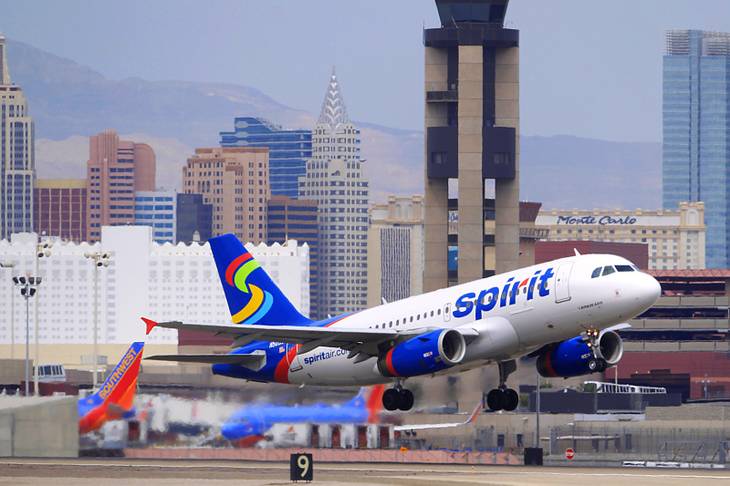
Richard N. Velotta
Related stories
One of Spirit Airlines’ top executives made a somewhat cryptic comment to me when he came to Las Vegas recently to talk about his airline’s new crew base that had just opened and the new twice-daily service between McCarran International Airport and Mesa Gateway Airport in suburban Phoenix.
Tony Lefebvre, chief operating officer of Spirit, said Las Vegans could “read the tea leaves” on what Spirit’s future plans might include for the city.
Last year, Spirit was the fastest growing airline at McCarran, adding routes to Los Angeles International, San Diego and Oakland, Calif.; Dallas-Fort Worth International; and Portland, Ore.
This year, it added the Mesa flights, and last week, it announced two daily flights to and from Denver beginning May 3. Spirit already had O’Hare International and Detroit flights to and from Las Vegas. Seasonal non-stops to and from Fort Lauderdale, Fla., begin next month.
The decision to place a crew base at McCarran is putting 200 more Spirit employees here. Pilots and flight attendants based locally don’t have to live here, but most of them do because of the convenience of starting their trips from McCarran and not having to commute to begin work.
It’s the second-largest crew base in Spirit’s system behind Fort Lauderdale, where the airline has dozens of flights to the southeast part of the country and the Caribbean.
Spirit also recently announced a fleet expansion and is taking delivery of five new airplanes this year.
So, how do you read the tea leaves? A new emphasis on Las Vegas, an expandable crew base at McCarran and a flock of new jets may be sending the signal that Spirit isn’t done growing in Las Vegas just yet. More flights could be on the way. Where they would go is anybody’s guess, but if I had to put money on it, I’d bet on more flights, more destinations, more employees and more customers — i.e. more Las Vegas tourists — in the next couple of years.
Spirit has a number of characteristics similar to another airline that has expanded over time in Las Vegas: Southwest Airlines.
Both have a low-fare mantra, although they’ve chased customers from different directions. Southwest convincingly markets itself as a low-fare leader; Spirit promotes its $9 Club, which works something like Costco and Sam’s Club. Buy an annual membership and you get access to fares the rest of the public doesn’t get.
Both airlines keep their costs down by flying one fleet type. For Southwest, it’s the Boeing 737, and it’s retooling its fleet with more fuel-efficient 737 MAX jets and larger capacity 737-800 jets. Spirit flies the Airbus family of moderate-range twin-engine jets ranging from the 145-passenger A319 to the 216-seat A321.
Both airlines have track records for flying alternate airports to keep their costs down but aren’t opposed to going to the major airports to generate more traffic. Southwest, for example, flies to Dallas Love Field and Chicago Midway instead of Dallas-Fort Worth International and Chicago O’Hare. Spirit has chosen Fort Lauderdale and Mesa Gateway over Miami International and Phoenix Sky Harbor.
Both have their fair share of fans and haters. I have many friends who swear by Southwest because it doesn’t charge extra for baggage like most airlines, while others won’t touch Southwest because they dislike not getting to choose their seats when they buy their tickets and there’s no comfortable first-class cabin.
Others swear by Spirit’s fare club, bragging about getting from Las Vegas to San Diego and back for under $60, while others detest Spirit’s barrage of add-on fees for carry-on bags as well as baggage. Oh, yes, and also that “unintended consequences fee” that Spirit recently assessed to all passengers that supposedly offsets the added cost to the airline of refunding money to customers without penalty if they change their plans within 24 hours of a ticket purchase.
Critics call it nickel-and-diming the public; Spirit calls it being compensated for the U.S. Department of Transportation imposing new consumer protection rules that the airline’s management believes are unnecessary and cost the company money to implement.
No matter how you feel about the practices and policies of Spirit, Southwest or any other airline, Las Vegans can agree that whatever growth Spirit brings to the market should be good for our economy and bring us another step closer to an unprecedented 40 million visitors to our city.
